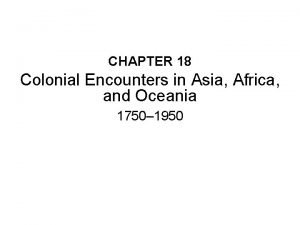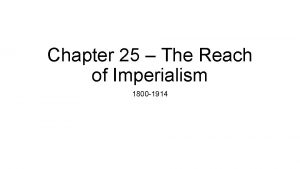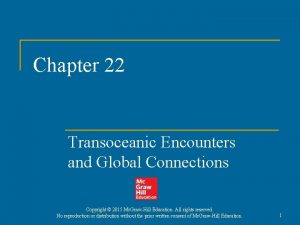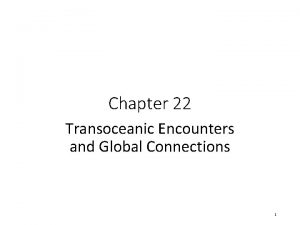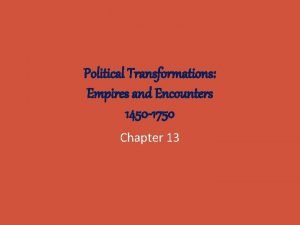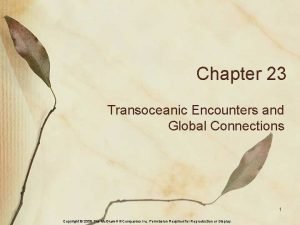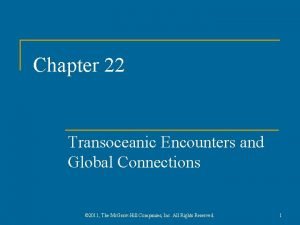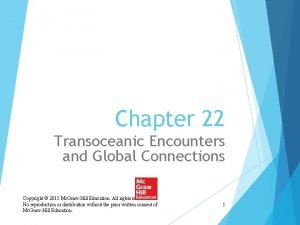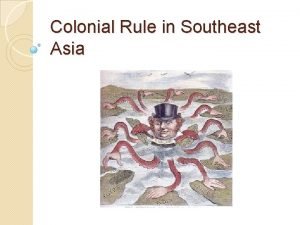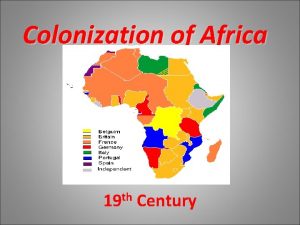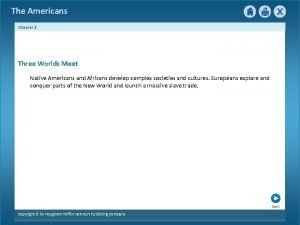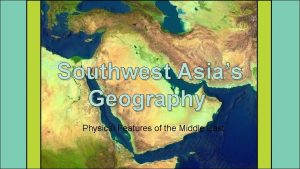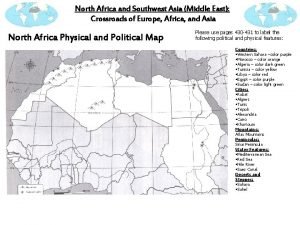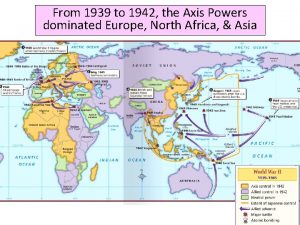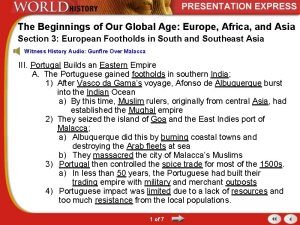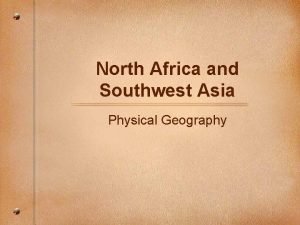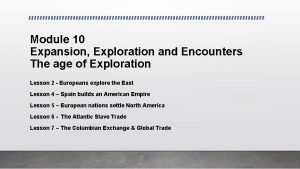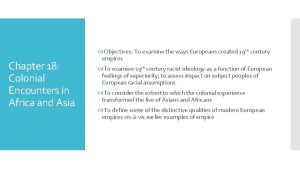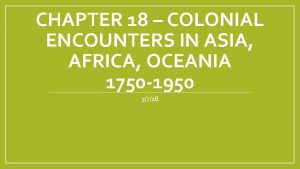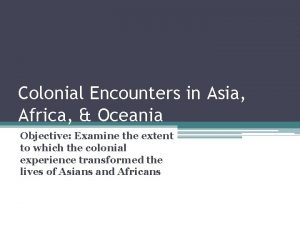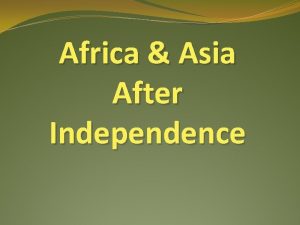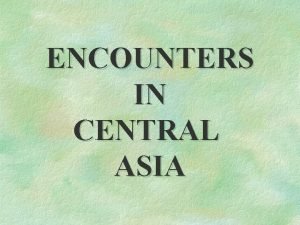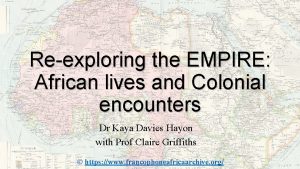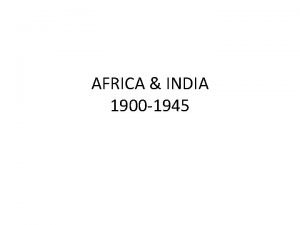CHAPTER 18 Colonial Encounters in Asia Africa and




























- Slides: 28

CHAPTER 18 Colonial Encounters in Asia, Africa, and Oceania 1750– 1950


I. Industry and Empire A. Industrial Revolution fueled Europe’s expansion B. European’s perceptions of the “other” changed during industrialization



II. A Second Wave of European Conquests A. Second phase of colonial conquest 17501990 B. Establishment of second-wave European empires C. Becoming a colony happened in a variety of ways D. Asian and African societies: wide range of responses



III. Under European Rule A. Cooperation and Rebellion 1. Some groups cooperated with new masters 2. The promotion of European education 3. Periodic rebellions

III. Under European Rule B. Colonial Empires with a Difference 1. Race distinguished rulers from the ruled 2. Racism especially pronounced in areas with large number of European settlers 3. Colonial states imposed deep changes in daily lives 4. Colonizers counted and classified subjects 5. The role of gender 6. Colonial policies contradicted European values

IV. Ways of Working: Comparing Colonial Economics A. Economics of Coercion: Forced Labor and the Power of the State 1. Unpaid labor on public projects (Congo Free State) 2. “Cultivation system” of the Netherlands East Indies 3. Resistance to forced cultivation of cash crops


IV. Ways of Working: Comparing Colonial Economics B. Economies of Cash-Crop Agriculture: The Pull of the Market 1. Many happy to increase production for world markets 2. Mekong Delta (French-ruled Vietnam) 3. Southern Gold Coast (Ghana) 4. Colonies specialized in one or two cash crops

IV. Ways of Working: Comparing Colonial Economics C. Economics of Wage Labor: Migration for Work 1. Wage labor common 2. African Migrants in several directions 3. Asia: 28 million Indians and 19 million Chinese 4. Colonial cities attracted many workers


IV. Ways of Working: Comparing Colonial Economics D. Women and the Colonial Economy: Examples from Africa 1. Precolonial Africa: active farmers 2. Colonial economy: subsistence work, left home 3. Colonial economy: small trade and marketing


IV. Ways of Working: Comparing Colonial Economics E. Assessing Colonial Development 1. Defenders: Jump-started modern growth; Critics: long record of exploitation and limited, uneven growth 2. Helped integrate Asian and African economies into modern global exchange network 3. Did not lead to breakthroughs to modern industrial societies

V. Believing and Belonging: Identity and Cultural Change in the Colonial Era A. Education 1. Western education brought new identity 2. Created cultural divide: educated and noneducated 3. Western-educated elite saw colonial rule as path to a better future


V. Believing and Belonging: Identity and Cultural Change in the Colonial Era B. Religion 1. Widespread conversion to Christianity 2. Christianity attractive in Africa 3. Conflicts over gender roles and sexual norms 4. Christianity Africanized with “independent churches” 5. Christianity did not spread widely in Islam



V. Believing and Belonging: Identity and Cultural Change in the Colonial Era B. “Race” and “Tribe” 1. Race and ethnicity central to new ways of belonging 2. 1900: African thinkers begin to define “African identity” 3. Twentieth century: Africans take part in World War I 4. Idea of “tribe” or ethnic identity




 Chapter 18 colonial encounters in asia and africa
Chapter 18 colonial encounters in asia and africa Colonial encounters in asia africa and oceania
Colonial encounters in asia africa and oceania Chapter 25 lesson 2 empire building in africa
Chapter 25 lesson 2 empire building in africa Transoceanic encounters and global connections
Transoceanic encounters and global connections Transoceanic encounters and global connections
Transoceanic encounters and global connections Chapter 5 political transformations empires and encounters
Chapter 5 political transformations empires and encounters Traditions and encounters chapter 23
Traditions and encounters chapter 23 Chapter 22 transoceanic encounters and global connections
Chapter 22 transoceanic encounters and global connections Bentley and ziegler
Bentley and ziegler Transoceanic encounters and global connections
Transoceanic encounters and global connections Expansión colonial en asia
Expansión colonial en asia Colonial rule in southeast asia
Colonial rule in southeast asia Colonial africa
Colonial africa Chapter 1 three worlds meet answer key
Chapter 1 three worlds meet answer key Inlet of indian ocean between africa and asia
Inlet of indian ocean between africa and asia South west asia and north africa map
South west asia and north africa map Political map of north africa and southwest asia
Political map of north africa and southwest asia Goodguysww.
Goodguysww. Inlet of indian ocean between africa and asia
Inlet of indian ocean between africa and asia European imperialism in africa and asia webquest answers
European imperialism in africa and asia webquest answers Country uniting africa and sw asia
Country uniting africa and sw asia America 2 europe
America 2 europe Kums definition geography
Kums definition geography The beginnings of our global age europe africa and asia
The beginnings of our global age europe africa and asia North africa southwest asia physical map
North africa southwest asia physical map North africa and southwest asia mountains
North africa and southwest asia mountains Module 10 expansion exploration and encounters
Module 10 expansion exploration and encounters Encounters and foundations to 1800
Encounters and foundations to 1800 Encounters and foundations to 1800
Encounters and foundations to 1800
